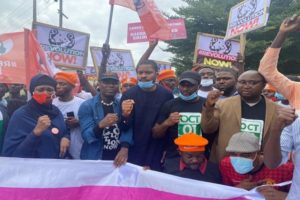By Isa Ismail
More than one month after the street protests that jolted the Nigerian nation, the dusk is yet to settle on the ripples of the agitation over police brutality and failure of governance in the country, which were subsumed in the EndSARS protests.
The protests, as we now know, were a metaphor for the many things wrong with Nigeria and for which urgent reforms are needed. However, the fatalistic twists that brought the protests to their abrupt end have now left the country and its people counting losses on different ends and at different levels.

From Lagos to Kano, Nigerians of all shades and hues continue to tell stories of how much losses they have endured, as occasioned, first, by the protests and, then, the debilitating slide into a senseless orgy of violence and looting by some Nigerians on the one hand, and state actors on the other.
The woes of destruction, arson and carnage that characterised the descent into lawless by otherwise lawful protests have left many casualties among Nigerians and the count may not have ended, especially as the EndSARS protests have now snowballed into many developing stories and with possibly as many sides to them as the population of the country; all of which have taken on lives of their own.
The Lekki shooting (the jury is still out on whether killings were involved), which signposts the degeneration of a peaceful assembly of unarmed citizens into a forceful use of might by the Nigerian state through the now controversial military deployment, has become a monumental snag in the rather half-hearted attempt by the government to accede to the ‘expanded’ demands of the EndSARS movement and come fully clean on its response to the agitation against systemic injustice in law enforcement in the country.
Regrettably, fake news and misinformation have been overboard on this case, to the extent that the judge had to draw the attention of the defendants, their lawyers and social media enforcers to relevant sections of the Constitution on sedition, defamation and contempt of court, as the case awaits formal application for bail by the defendants.
Perhaps, the merchants of misinformation who are now hiding under the EndSARS banner need to be told that the difference between the court room and the social media space is that judges are bound by evidence and facts of cases brought before them, while the social media space is driven by sentiments chorused by those whose ‘voices’ are louder or those who could earn more likes and shares, even where it is clear, as we have seen in may cases, that facts are being distorted and the integrity of the judiciary is impugned and judges are maligned by the new tribe of purveyors of fake news.
Conflicting videos have emerged in the last few weeks to suggest that there may as well be more than meets the eye in the unfolding story of the Lekki shooting. Like the Lekki tollgate, which became the epicentre of the protest when it was occupied by protesters, with attendant revenue losses by the Lekki Concession Company, operators of the toll plaza, several Nigerians, including the police, the military, politicians, corporate Nigeria and government at all levels, have been victims of the unfortunate negative dimensions to the demand for an end to systemic injustice in Nigeria.
The raid on warehouses, public facilities and homes allegedly housing palliatives meant to cushion the economic impact of the COVID-19 pandemic on the citizenry and the eventual knee-jerk reaction by the government and its operatives to stem the descent into violence by restive youths across the country, is a grim reminder that there may well be deeper social issues behind the EndSARS protests and there may as well be casualties in high and low places beyond what is known or can be accounted for at this point.
Unintended consequences of the events of the last few weeks have been such that hitherto untouchable or revered personalities and places, including journalists and media organisations, lawyers and even judges who are gatekeepers of the temple of justice, have all suffered some forms of damage as a result of or from the aftermath of the protest.
While the most regrettable consequence of the EndSARS protest is the loss of lives of innocent Nigerians, it is becoming apparent that the list of casualties of the protest have extended far beyond ordinary Nigerians and government officials or operatives who may have been complicit in the systemic failures the protest was meant to redress.
Sadly, the judiciary which epitomises the truth in every society has been drawn into the miasma of the narratives peddled back and forth by the contending sides in the fight for equity and justice in the country and more so by the multitude of pretenders who are out to malign revered institutions and persons in furtherance of a divisive and selfish agenda.
These agents of falsehood and wholesale misinformation, who are bent on making the truth and the judiciary casualties of their anarchist agenda, may have hijacked and impersonated the genuine struggle by the EndSARS movement by adding invectives through the unabashed purveyance of fake news in the guise of the ethically-deficient claim to citizen journalism that has continued to turn facts and truth on their heads.
A new twist in the campaign of calumny against lawyers and judges in Nigeria is the suppression of the judiciary, which is evident in the contemptuous social media binge over the arraignment of six persons over the allegation of disturbance of public peace and seditious chants of ‘Revolution Now’ at the FCT Magistrate Court sitting at Wuse Zone II in the FCT judicial division Abuja on November 6.
According to judicial correspondents who covered the court proceedings, ‘the six defendants pleaded not guilty to charges read out in English and translated in Hausa, as presented by the Nigeria Police which is the plaintiff in the case.
Upon their pleading not guilty to the charges, an application for bail was made orally and without any emphasis on the peculiarities of the case at hand and without any recourse to the delimitating factors of the appropriate section, which is Section 162 of the Administration of Criminal Justice Act, under which the application is meant to be made by counsel to the defendants who relied on sections that were not relevant to the application.
In the light of the application, which ought to be made in writing since the offence alleged to have been committed attracts more than three years in prison if found guilty according to Section 162 of the ACJA, the drama according to other sources close to the case played out following the inability of the defendants’ lawyer to present a written application and to convince the court by citing the relevant section in his application for bail.

Consequently, the judge ruled that the six defendants be kept in a correctional facility until there is a formal application for bail.
While the judge was waiting for a formal application, as it is the procedure, for the case to be heard by Monday November 8, social media went agog with posts contemptuously and dangerously impugning on the integrity of the judge, the court and indeed the judiciary.
It is on record that the wild allegations and fictitious narrative peddled by purveyors of fake news to suppress the wheel of justice by maligning the integrity of the judge have remained unfounded and evidently cynical, since there is no link or collusion between the judge and the plaintiff, as alleged by the merchants of fake news.
Regrettably, fake news and misinformation have been overboard on this case, to the extent that the judge had to draw the attention of the defendants, their lawyers and social media enforcers to relevant sections of the Constitution on sedition, defamation and contempt of court, as the case awaits formal application for bail by the defendants.
Perhaps, the merchants of misinformation who are now hiding under the EndSARS banner need to be told that the difference between the court room and the social media space is that judges are bound by evidence and facts of cases brought before them, while the social media space is driven by sentiments chorused by those whose ‘voices’ are louder or those who could earn more likes and shares, even where it is clear, as we have seen in may cases, that facts are being distorted and the integrity of the judiciary is impugned and judges are maligned by the new tribe of purveyors of fake news.
The dangerous dimension of fake news and fictional narratives, especially on the social media by people who are utterly bereft of journalistic ethos, have the capacity not only to suppress the judiciary and the truth, it is a clear and undeniable threat to our democracy.
This practice has no place in our laws and practitioners of responsible journalism who are guided by the principle of social responsibility should stand up and speak against this high street expression of freedom without responsibility by a new brand of careless social media ‘warriors’ seeking validation in journalism and free speech.
Isa Ismail is a communications consultant